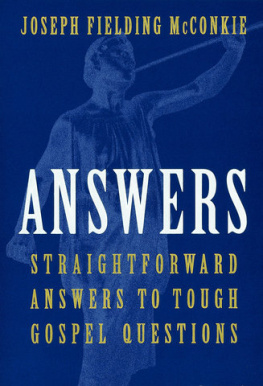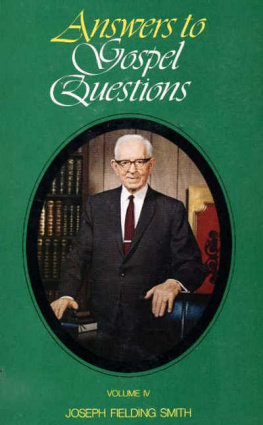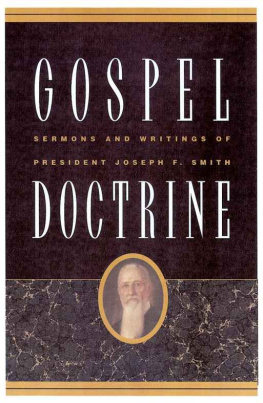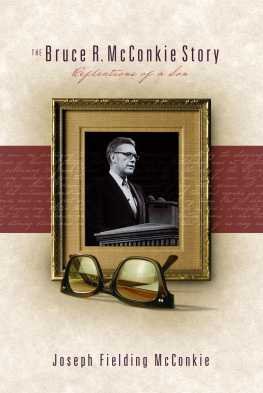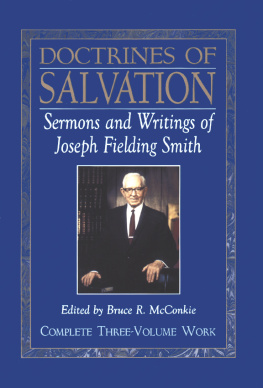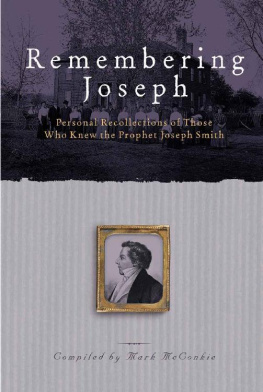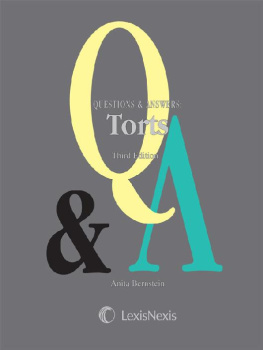Answers: Straightforward Answers to Tough Gospel Questions
Joseph Fielding McConkie
1998 Deseret Book Company. All rights reserved. No part of this book may be reproduced in any form or by any means without permission in writing from the publisher, Deseret Book Company, P.O. Box 30178, Salt Lake City, Utah 84130. This work is not an official publication of The Church of Jesus Christ of Latter-day Saints. The views expressed herein are the responsibility of the author and do not necessarily represent the position of the Church or of Deseret Book Company. Deseret Book is a registered trademark of Deseret Book Company.
TO HONEST SEEKERS OF TRUTH
YOU ARE NOW IN THE PRESENCE of the Holy Ghost," Elder Hugh B. Brown of the Quorum of the Twelve testified to the large group of young missionaries who sat before him. "And when you go back to your digs tonight, I want you to write your parents and tell them that you have felt his presence."
The moment Elder Brown told us we were in the presence of the Holy Ghost, we knew it and could say in our hearts, "Yes, I know that I am." Yet, most of us, inexperienced in the things of the Spirit, would not have known what it was that we were experiencing without the help of an able and experienced guide. It is a wonderful blessing, as we seek to grow in the things of the Spirit, to have an experienced mentor at our side. That has been my blessing at various periods of my life and one for which I am very grateful. I think particularly of my father, grandfathers, and mission president. They were visionary men who knew how to pray and how to get answers. From them I learned the most important lessons of my life. This volume seeks to share the lessons and the principles I learned from them. They were master teachers, and to the extent that this work reflects light and truth, the credit is theirs. As to anything that does not measure up to that standard, the responsibility is mine and the shame is that I was not a better student. Of greater importance, however, is that I am still a student and revel in the opportunity to improve my views and increase my understanding. Whether student or teacher, our obligation is to discover truth and to share the truth we discover.
WITH REAL INTENT
To find the truth we must first desire to find the truth. Far too often we ask questions to seek confirmation for something we have already chosen to believe or a course of action we are unwilling to change. Often we keep refining and re-asking our questions until we hear what we want to hear. Contrast such a course with this statement by Elder Bruce R. McConkie:
"I often think as I go around the Church and preach in various meetings that it just does not make a snap of the fingers difference to me what I am talking about. I do not care what I talk about. All I am concerned with is getting in tune with the Spirit and expressing the thoughts, in the best language and way that I can, that are implanted there by the power of the Spirit. The Lord knows what a congregation needs to hear, and he has provided a means to give that revelation to every preacher and every teacher.
"We do not create the doctrines of the gospel. People who ask questions about the gospel, a good portion of the time, are looking for an answer that sustains a view they have expressed. They want to justify a conclusion that they have reached instead of looking for the ultimate truth in the field. Once again, it does not make one snap of the fingers difference to me what the doctrines of the Church are. I cannot create a doctrine. I cannot originate a concept of eternal truth. The only thing I ought to be concerned with is learning what the Lord thinks about a doctrine. If I ask a question of someone to learn something, I ought not to be seeking for a confirmation of a view that I have expressed. I ought to be seeking knowledge and wisdom. It should not make any difference to me whether the doctrine is on the right hand or on the left. My sole interest and my sole concern would be to find out what the Lord thinks on the subject" ("Foolishness of Teaching," 8).
Speaking at the funeral of Elder McConkie, Elder Boyd K. Packer observed: "He could not measure what ought to be said and how it ought to be said by [asking], `What will people think?' Would his sermons leave any uncomfortable? Would his bold declarations irritate some in the Church? Would they inspire the critics to rush to their anvils and hammer out more `fiery darts' as the scriptures call them?
"Would his manner of delivery offend? Would his forthright declarations, in content or in manner of presentation, drive some learned investigators away? Would he be described as insensitive or overbearing?
"Would his warnings and condemnations of evil undo the careful work of others whose main intent was to have the world `think well of the Church'? Perhaps it was given to other men to measure their words in that way, but it was not given to him.
"We have talked of this. And when he was tempted to change, the Spirit would withdraw a distance and there would come that deep loneliness known only to those who have enjoyed close association with the Spirit, only to find on occasion that it moves away. He could stand what the critics might say and what enemies might do, but he could not stand that.
"He would be driven to his knees to beg forgiveness and plead for the renewal of that companionship with the Spirit which the scriptures promise can be constant. Then he would learn once again that what was true of Holy Men of God who spake in ancient times applied to him as well. He was to speak as he was moved upon by the Holy Spirit. What matter if it sounded like Bruce R. McConkie, so long as the Lord approved. I knew him well enough to know all of that" (Salt Lake City, Utah, 23 April 1985, 6-7).
In the realm of gospel answers, we generally find what we want. If we want justification for a particular course of action, we often will search until we find it. If we want to defend some idea, we may filter out anything that does not sustain it. And if we want to discover the mind and will of the Lord, we generally find that also. We cannot inquire of the heavens with real intent and a sincere heart if we have already determined what we will accept as an answer. What must be understood is that it is "counted evil unto a man, if he shall pray and not with real intent of heart; yea, and it profiteth him nothing, for God receiveth none such" (Moro. 7:9).
BE BELIEVING
The pattern of scripture is that God reveals that which those to whom the revelation is initially given are willing to believe. When Nephi sought to see the vision shown his father, the angel who acted as his mentor asked, "Believest thou that thy father saw the tree of which he hath spoken?" (1 Ne. 11:4). Only Nephi's affirmative response allowed him to proceed. Before the Lord manifested himself to the brother of Jared, He asked, "Believest thou the words which I shall speak?" (Ether 3:11). It was clearly expected that the commitment to believe preceded the explanation of what he was to believe. We find this same spirit in the story of Aaron teaching Lamoni's father. When Aaron asked, "Believest thou that there is a God?" the king responded, "If now thou sayest there is a God, behold I will believe." And again the king said, "I will believe thy words" (Alma 22:7, 11). Still again we find this spirit in Alma's often quoted discourse in which he likens the word of God to a seed: "Blessed is he that believeth in the word of God, and is baptized without stubbornness of heart, yea,

